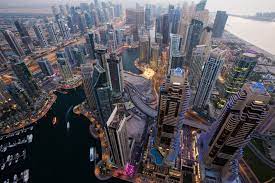Beneath the Gold of Gulf Countries
Ramesh, a 32-year-old man, had vivid memories of the day when he landed on the land of gold. The glittering town of the UAE induced a spark in him to become a hotshot. The gleaming high rise buildings, ultramodern architecture, world-class retail markets, buzzing highways, luxury tourist attractions and gorgeous beachfront hotels. This was a short-lived glory, however, not enough to keep up the hopes of Ramesh as he came across the grim reality of the system underneath. He ended his life by jumping off from one of the high rise buildings.
Ramesh was an Indian migrant manager in a construction company in UAE. He was let go without a reason or his last month’s salary. According to the terms of his contract, there must be either a month’s notice or a 30-day salary. Because he had not been given any warning, he sought the latter, which the company flatly refused to pay. The company even failed to provide the food allowance which was mentioned in the contract. He was thrown out of the company’s residency area without being paid for all the work he did, which made him a victim of wage theft. Empty-handed, with a pending loan and family to look for back in India, Ramesh felt like his world crumbled down beyond repair. As his dreams were shattered, fighting for survival means on toes, bereft of basic human rights and with despair too much to handle, he committed suicide.
This is not one story, this is one of the many. According to the reports of Walk Free Foundation, an estimated 520,000 men, women, and children are living in modern slavery in the Gulf countries and over half of all victims of forced labour exploitation were held in debt bondage. Migrant labourers at construction companies in the Gulf countries have few legal rights in city-state legal systems, and the vast majority work in extremely hazardous conditions on massive construction sites, frequently risking death or serious physical injury, working long hours without breaks and a lack of basic safety precautions. They are made to live in pathetically managed dorms where 20-30 people share one bathroom. Passports and other necessary documents required to travel are immediately confiscated and they are shifted from place to place to work day and night leaving no choice of getting out and spending leisure time. Other work profiles like drivers, cleaners, caretakers, security guards, carpenters, plumbers, pipefitters, stonemasons meet the same fate.
This condition binds them to work tirelessly for which they are not even adequately paid. This leaves no choice for them to educate their children or pursue education for themselves and change employers.
What gives these employers the power to immeasurably exploit migrant workers left, right, centre? It is the enactment of the kafala system in which the worker has to take the employer’s permission for leaving the worksite or to leave the job. It is present in Bahrain, Kuwait, Oman, Qatar, Saudi Arabia, the United Arab Emirates as well as Jordan and Lebanon which comprise Gulf Cooperation Council (GCC) countries. Kafeel (the sponsor or employer) has the right to hold any worker’s exit visa. If the workers try to revolt, Kafeel could get the workers locked up in jail by wrongly accusing them of any vague crime. Workers have no protection under the host country’s labour legislation because the system is under the authority of interior ministries rather than labour ministries. The kafala regulations become quintessential in proving how these countries turn these workers into slaves.
As we read about it at the moment, these countries are devising ways to regulate their labour system to prove that they are bringing progressive changes. While it could be a significant step, there is still the possibility of continuous systematic abuse.
The last time this grave situation was taken into consideration was back in 2016 when the International Trade Union Confederation (ITUC) got into talks with Gulf Cooperation Council (GCC) countries talking about implementing the 2014 International Labour Organisation (ILO) Forced Labour Protocol. These protocols promised to abolish the kafala system and to end the practice of holding exit visas by sponsors. It also pledged to allow workers to form or join unions, end discriminatory practices and ensure minimum wages. The intervention of a globally renowned body gave hopes of changes being effected. But as the pandemic happened and these migrant workers flew back home, the stories they had to tell were otherwise. In a livid apartment cramped with 20-30 people, social distancing was a privilege. They went hungry for days due to the shortage of food supply and some were even forced to keep on working in such drastic conditions. “God knows how I kept up with everything, the only thing that kept me alive was the thought of my children…”, says Prem who was forced to continue his work even in the pandemic due to debt he owed the recruitment agent.
Qatar winning the hosting rights for the 2022 FIFA World Cup was announced with all pomp and show. As we peek into the backstage, migrant labourers working on the restorations of the Khalifa Stadium for the event are being exploited and subjected to forced labour. They can’t change jobs or leave the country. They often wait months to get paid. Meanwhile, the event would be bringing in a lot of money for the construction businesses involved in the tournament. It makes it quite evident that the conferences, the “we want everyone to be treated equally” narrative and the forsaken concern shown by the United Nations, politicians and diplomats change nothing on the ground.
Ramesh has departed but the reasons which took his life get to live and these reasons are taking more lives. It is time we let this issue enter the mainstream discourse, both, in the form of adequate intervention by the authoritative bodies and by us, as we propagate ideas to alleviate a dated and an exploitative system.




Comments